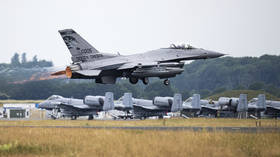Ukraine accuses Western backers of failing to uphold F-16 pledge
The training of Ukrainian pilots in F-16 fighters did not start in June, contrary to an earlier promise, FM Dmitry Kuleba has said
Ukraine was told that its pilots would start training in F-16 fighter jets in June, but the program has not yet been launched, the Ukrainian foreign minister has claimed.
“One of the countries,” which is part of the so-called “fighter jet coalition,” promised that the scheme would start last month, Dmitry Kuleba said during a TV appearance on Monday.
“The training did not start in June. This means that the schedule is starting to shift… We’re now working with all the parties involved… to speed this process up as much as possible,” he said.
According to the minister, the unnamed country “miscalculated” when it made its pledge to Kiev, but is continuing to make preparations for Ukrainian airmen to be trained with the American aircraft.
Kuleba said he was previously expecting to get the F-16s in the first few months of 2024, but the delay in training now means the wait will be longer.
Last month, Igor Zhovkva, an aide to Ukrainian President Vladimir Zelensky, said nine countries – the US, UK, the Netherlands, Poland, Denmark, Sweden, Belgium, Portugal and France – had formed a coalition to help Ukraine obtain the warplanes.
The chairman of NATO’s military committee, Admiral Rob Bauer, told the British radio station LBC on Monday that the issue of providing F-16s to Ukraine “will not be solved in the short term for this counteroffensive.”
Kiev has intensified its attacks along the frontline with the use Western-supplied tanks and armored vehicles since early June, but according to Moscow, the much-hyped counteroffensive has failed to achieve significant gains so far.
Zelensky has been pressing his Western backers for fourth-generation F-16 warplanes for months, arguing that they are crucial in providing air cover for Ukraine’s troops and defending its airspace, amid a massive Russian missile campaign targeting military facilities and energy infrastructure.
In late May, US Chairman of the Joint Chiefs of Staff Mark Milley warned that “the F-16 will not act as a magic weapon” in Ukraine, but will “cost a dollar” to Kiev’s backers.
Moscow has repeatedly warned that deliveries of more sophisticated weapons to Ukraine by the US and its allies could cross its ‘red lines’, leading to a major escalation of hostilities. Russia argues that the provision of arms, intelligence sharing and training to Kiev’s troops already means that Western nations are de facto parties to the conflict.






Comments are closed.